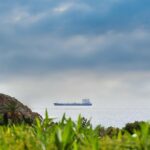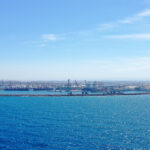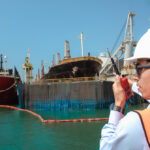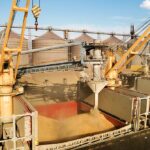In recent months an increased number of notifications has been received with respect to scrap metal cargoes catching fire during the voyage. This increase has been specifically noted for the cargo loaded in the ports of East Coast USA and notably in the port of Ghent (Belgium).
When loading scrap metal members must ensure that they are aware of the cargo specifications when asked to carry scrap metal. ‘SCRAP METAL’ is a bulk cargo shipping name (BCSN) found in the IMSBC Code. It is a Group C cargo but it must not contain fine metal turnings known as ‘swarf’. It is important to understand that if this scrap metal does contain “swarf”, then it would likely fall under the schedule ‘FERROUS METAL BORINGS, SHAVINGS, TURNINGS or CUTTINGS UN 2793’, which is a Group B cargo of IMSBC Code.
As per the IMSBC Code, scrap metal should be kept as dry as practicable before loading and not loaded in the rain. When loaded in wet condition this may accelerate the oxidization process which in turn can lead to fire. If the cargo contain swarf, turnings, or other contaminants such as timber or rags, this may lead to fire. Also when cargo is being sprayed on by water during loading ( to minimize dust) this may increase the risk of fire.
We further recommend our members to be vigilant when loading scrap metal cargoes and instruct the master and crew to closely monitored for swarf or other contaminants and avoid loading in rain. Members should also ensure that the temperatures inside the cargo are checked regularly during loading and during the voyage. If the temperature before or during loading exceeds 55 °C the Master should alert their Principal as there may well be a danger of combustion. Temperature rising to 80 °C, during the voyage indicate a potential fire risk and the vessel should immediately proceed to the nearest port.
Members should furthermore consider the potential danger to their crew as there is a hazard of oxygen depletion in the cargo holds due to oxidation of cargo. When entering enclosed spaces, the crew should make sure to use the necessary safety equipment (incl. breathing apparatus )
It is recommended that members request Shippers to declare in writing that the scrap metal cargo does not include borings, shavings, turnings or cuttings that encourage self-heating. This declaration, together with a copy of the cargo specifications should be presented well before the load date so that members may still have time to scrutinize this.
Members are also recommended to ensure that charter parties allocate liabilities between the parties in a clear and unambiguous way and contain provisions which ensure that the cargo is properly documented and must be carried in accordance with IMSBC and that cargo documentation (including the Shippers’ declaration) is presented in a timely fashion.
In case members require assistance in respect of the carriage of these cargoes they are invited to contact NNPC via claims@nnpc.nl.




